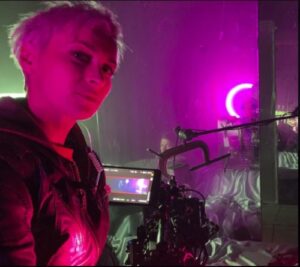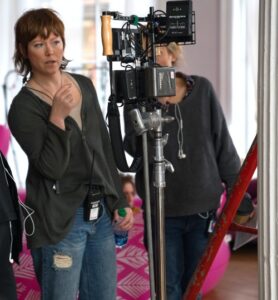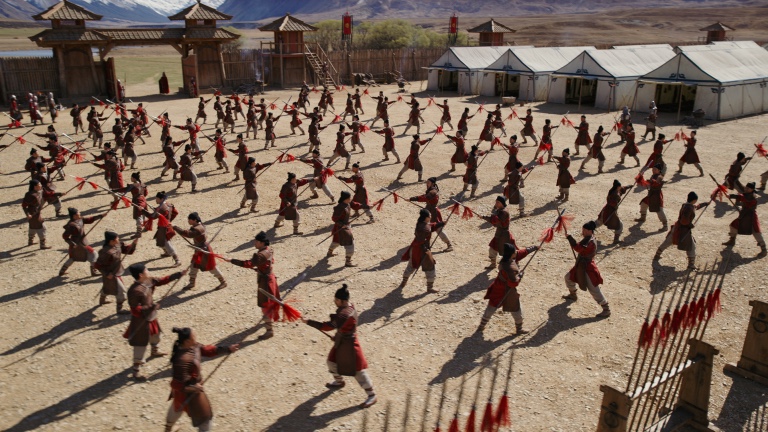
Most readers of this space will have already seen the open letter from the cinematography community, signed by a veritable who’s who of ASC and BSC members, Oscar and Emmy nominees, all the way up to ASC President Stephen Lighthill. It calls for a ban on all functional firearms on sets, along with a “vow to no longer knowingly work on projects using FUNCTIONAL FIREARMS (caps theirs) for filming purposes.”
The letter, which you can read in its entirety here, remembers Cinematographer Halyna Hutchins as “an incredible rising-star cinematographer who passionately loved her job and cared deeply about the images she created. She was a friend, a colleague.” It calls her death “senseless, negligent and avoidable,” vowing that the community won’t “let her death be in vain.”
The “instigator” of the letter, DP Autumn Eakin, did all this while overseas on a shoot in Hungary. We caught up with her, over a Zoom session, one evening after she’d wrapped, to discuss the genesis of the letter, and where things might be headed next.

“I knew Halyna,” she told us, “and have known her for years in the industry — it’s a small enough world of female cinematographers. I’ve been in the union since I was twenty-four. At the end of the day, I just got very incensed — we shouldn’t be having lethal weapons on set [so] I got the idea to specifically get DPs together.”
She started gathering them by “bringing Julia Swain on, because she was close friends with Halyna, and is also a DP. I wanted to have someone taking part who was close friends with [her]. Then I asked Dana Gonzales, who had been vocal on social media, and David Mullen [both ASC] if they wanted to put their names on it,” to spur even more prominent members of the community to sign, which clearly it did.
She also “spoke with [Local 600 Executive Director] Rebecca Rhine [and] she passed it on to [600 President and ASC member] John Lindley. It’s one thing to put it out in the media, it’s another to do it in Halyna’s honor.”
But regardless of how prominent they might be, Eakin says that DPs have “all been put in positions where we’re supposed to look out for our crew, but we’re not in the producorial position to make all those decisions.”
Also, there’s no real way to contractually demand such safety measures from producers now, since the IA is in the middle of its contract ratification process, and no new demands can be added. Additionally, it’s not just the cinematographers in Local 600 negotiating, but all locals, including the crafts-folk in 44. That, in turn, includes armorers, who see their own jobs potentially imperiled.
So a quicker path for reform, in this case, may be the legislative one. And indeed, the Democratic governors of both California and New Mexico, Gavin Newsom and Michelle Lujan Grisham, have already called for such legislation. As Eakin says, “It might be faster to have individual state lawmakers move forward with things like that.”
One individual lawmaker doing just that is San Jose State Senator Dave Cortese, again declaring that, “He will soon unveil legislation for the 2022 session that would prohibit the use of live ammunition and guns that can fire live rounds in theatrical productions.”
Interestingly, though, the same Sacramento Bee article quoting him, also cites the Assembly member from Fullerton, Sharon Quirk-Silva, saying, “The unions that have historically negotiated workplace safety regulations should determine what needs strengthening. As far as saying no live ammunition, I would want to hear from both sides, the motion picture industry and workers.” Since she’s Chair of the Assembly’s Arts, Entertainment, Sports, Tourism and Internet Media Committee, it’s fascinating, to say the least, that she divvies up the concept of “the motion picture industry” from its workers.
As for members in 44 fearing they could lose work, Eakin says they’d still have a role to play in helping replica weaponry be used in more authentic fashion, and points out we already “have actors act like they’re getting punched, like they’re falling in love, like they’re driving stunt cars,” so “take them to the range — let them feel what (real weaponry) is like.”

Does she think a culture shift might presage any legislative remedies, if production companies simply refuse to allow real guns on set, much as Dwayne Johnson declared his Seven Bucks production company would do?
Eakin thinks, “That’s exactly what needs to happen. The next phase is putting it into union contracts, and/or laws.” But while she lauds these “excellent decisions,” such as on the ABC show The Rookie, she also adds, “Those are by choice. A different showrunner or different producers come on — they get to choose differently. The big factor for me is there’s always going to be some shady producer.
“For me, this is a logical no-brainer. Why is there a fight to keep guns on set? Why is this political?” She also mentions growing up in the Midwest, being familiar with the more conservative end of the political spectrum, and being contacted by national gun violence groups, after the letter’s release.
But she’s trying to keep the focus specifically as a workplace safety issue. Ironically, the current Supreme Court seems poised to roll back a New York law of over a hundred years standing, which would expand where concealed guns could be carried, including to workplaces, film biz, or otherwise. While that doesn’t affect “picture guns” directly, it seems likely that many more American job sites, union or otherwise, could potentially be suffused with “hot weapons,” regardless of front-of-camera regulations.
Nonetheless, in the wake of the letter, Eakin hopes there’s a gain in momentum on the legislative front, though she doesn’t discount the benefits of that “cultural shift” either, though not coming just from producers.
“We can make them feel the pressure,” she says, referencing one of the main tenets of the letter: a boycott of another sort, with crew simply refusing to come to sets where working firearms are used.
But she also doesn’t think it needs to come to that. Eakin observes, “We (already) create fake things, creatures, et cetera, for movies to make them feel real — why are we fighting so hard to specifically keep guns, which are designed to kill? There’s no world in which you can tell me of all the amazing things we create every day that we can’t figure this out.”
 Mark London Williams is a BTL alum who currently covers Hollywood, its contents and discontents, in his recurring “Across the Pond” dispatch for British Cinematographer magazine, contributes to other showbiz and production-minded sites, and musters out the occasional zombie, pandemic-themed, or demon-tinged book and script, causing an increased blurring in terms of what still feels like “fiction.”
Mark London Williams is a BTL alum who currently covers Hollywood, its contents and discontents, in his recurring “Across the Pond” dispatch for British Cinematographer magazine, contributes to other showbiz and production-minded sites, and musters out the occasional zombie, pandemic-themed, or demon-tinged book and script, causing an increased blurring in terms of what still feels like “fiction.”
Mark London Williams’ Strike Alert column will appear every Tuesday. You can reach him to give him tips and feedback at [email protected]. He can also be found on Twitter @TricksterInk.
Photos courtesy of subject or as noted.





